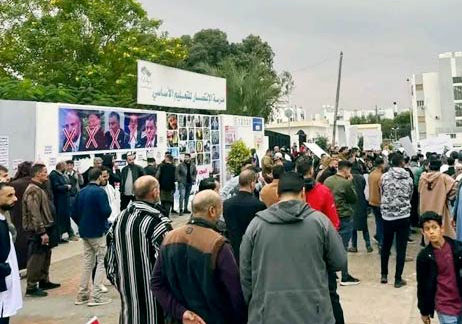Stalemate as Libya once again has two competing governments
Published on 2022 March 17, Thursday Back to articles
Tripoli show of force in support of GNU Prime Minister Abdulhamid Dbeibah
Libya is currently enveloped in chaos, as the incumbent Government of National Unity’s (GNU) Prime Minister Abdulhamid Dbeibah and the parallel self-styled Government of National Stability’s (GNS) chosen premier, Fathi Bashagha, are continuing it slug it out for control. Neither is showing any sign of backing down and their intransigence is casting a long shadow over the capital where there are signs of simmering unrest. Events almost spiralled out of control this month after Bashagha’s forces started advancing on Tripoli with clashes averted only at the last moment.
The struggle between Libya’s two competing prime ministers will continue to be played out. Neither Bashaga nor Dbeibah — nor those forces that are backing them — are ready to compromise yet, so the stalemate will persist for now and create further fault lines and divisions in western Libya.
This means that the capital will remain tense and the threat of escalation will continue. Although both sides are adamant that the situation should not be allowed to deteriorate to the point of armed conflict, it would not take much for violence to be triggered and for western Libya to be sucked back into serious armed conflict.
This conflict would probably be focused in the capital, with Misrata still maintaining that it will avoid conflict on its soil. However, other western towns — where support is split between Bashagha and Dbeibah, such as Zawiya — could also find themselves embroiled in clashes.
The ongoing ambiguity of the international community’s position will not help to resolve the situation. The UN’s insistence on pushing for elections rather than dealing with the reality facing the country will only prompt further agitation, and elicit more accusations that it is meddling in Libya’s internal affairs. It will also provide further sustenance to Dbeibah who is seizing upon the call for elections to justify his remaining in power.
Dbeibah’s legitimacy is, however, likely to be further eroded the longer he holds on, and especially after he is unable to hold elections by June in line with his roadmap. His position will be weakened yet more if the tribes in the Oil Crescent make good on their threat to halt oil production and exports. Dbeibah may therefore end up with no alternative but to step down in return for some sort of deal.
If Bashagha succeeds in installing his government in Tripoli, however, his path will not be easy. While he may have the support of eastern, he will face a major struggle with armed groups in the capital who will try to hinder him at every turn. This will only strengthen if they believe that he is he is determined to curb their power or is acting as a proxy for eastern Libya’s strongman, Khalifa Haftar, and his self-styled Libyan Arab Armed Forces (LAAF) which unsuccessfully besieged Tripoli in 2019-2020.
This excerpt is taken from Libya Focus, our monthly intelligence report on Libya. Click here to receive a free sample copy.


